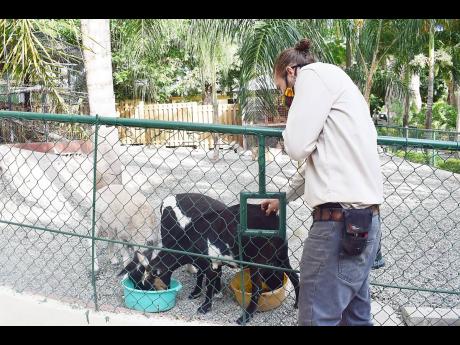Hope Zoo reopens - Implements physical distancing and sanitisation procedures
The Hope Zoo Preservation Foundation has reopened to the public following an almost three-month closure of public gardens and zoos.
To protect patrons and staff, the facility has implemented several physical distancing and sanitising measures, including using floor tape and signs to encourage personal space and mounting hand sanitiser dispensers and hand-washing stations.
All guests must have their temperature checked and the wearing of masks is compulsory.
“[Masks are] mandatory. No mask, no entry,” Valerie Juggan-Brown, director of the Hope Zoo Preservation Foundation told The Gleaner.
The Ministry of Industry, Commerce, Agriculture and Fisheries closed all public gardens under its control on March 20, to limit the spread of coronavirus (COVID-19) in Jamaica.
Hope Zoo reopened June 15 after Prime Minister Andrew Holness gave the green light for zoos, theme parks, and river rafting to resume operations for an initial period of two weeks, with a planned review on June 30.
After review, Holness announced adjusted opening hours of 10:00 a.m. to 4 p.m. for zoos.
Following closely the protocols intimated in the June 12 digital press conference, Hope Zoo’s petting zoo and budgie feeding facilities remain closed. With the overall aim of limiting interactions, guided tours have been suspended and guests have been permitted to bring their own food and drink.
The facility also has rigorous sanitisation procedures.
“We have been wiping down all the rails, on the hour, every hour. We have been disinfecting the bathrooms, following all the protocols as stipulated by [the] Government,” said Juggan-Brown.
Event and Marketing Manager Patrice Levy adds that the facility’s gazebos have also been equipped to keep guests safe.
“We have supplied hand sanitiser stations for every single gazebo. We have 10 gazebos and we have also installed two hand-wash stations within the zoo, separate and apart from the restrooms,” said Levy.
EASY SOCIAL DISTANCING
With 55 acres, social distancing has been easy.
“It’s easy to social distance here. We have so much land [and] the lawn to spread out. So, you know, it’s easy to come with your family and then still keep a distance from anyone else in the zoo,” said Joey Brown, the zoo’s curator.
A medical room has also been set up for COVID-19 isolation, should it be required.
Owing to repairs and renovations undertaken during the closure, the zoo now has a new look.
“We actually kind of painted and like fixed up our petting zoo area quite a bit. So, when we can open that, it’s gonna be very updated now. We updated some of our crocodile exhibits, which were, you know, built here in the early ‘60s when the zoo first opened; and we kind of repainted and landscaped all those. They’re much nicer now,” said Brown.
The zoo’s rescue arm, a partnership with the National Environment and Planning Agency (NEPA), is also going strong. A crocodile was rescued last week from the Stony Hill area and will, after rehabilitation, be released back into the wild.
“[That’s] still ongoing, we get those rescue calls working as a NEPA sanctuary. NEPA [actually] just brought another barn owl. So that’s just continuous, [rescuing] the crocodiles and the birds. Working with NEPA [is] an ongoing relationship,” said Brown.
Now that the gates are open, the zoo is offering specials and discounts to bring people out to enjoy the facilities and animals there.
Its ‘Post-COVID’ discount of $1,000 per person, implemented June 15, has been extended to the end of July and there are plans for several other discounts and packages.
“I think, you know, we have a great opportunity for people to get outside and get out of the house a bit,” said Brown.
The zoo had a Father’s Day special on June 21. Fathers were allowed free entry into the zoo.
Even without specials, the guests are returning, much to the delight of the macaws.
“The macaws are very happy,” said Levy.
“Some animals, they could care less and some animals, the macaws, who love the people interaction stuff, you know, they’re constantly [saying] ‘Hello’ [and] talking and stuff. So they get a kick out of whenever there are kids and families walking around. More interaction for them,” shared Brown
As the zoo crafts its own ‘new normal’, they remain grateful for the help extended to them during the heights of closure.
The GoFundMe campaign launched May 5 to help them weather the pandemic raised a total of US$10,030 from 160 donors and helped to provide much-needed support.
“It has been critical just to help with the daily needs, you know, food, diet and even medical needs we talked about. We have over 1,000 animals and there are extensive needs on a daily basis to keep these animals fed and healthy. So pretty much all the money went to helping support and feed a lot of those animals, food and medical supplies as well,” said Brown.
To learn more about the Hope Zoo Preservation Foundation, follow @HopeZooKingston on Instagram and Twitter. Have a good story you’d like to share? Email us at goodheart@gleanerjm.com.

